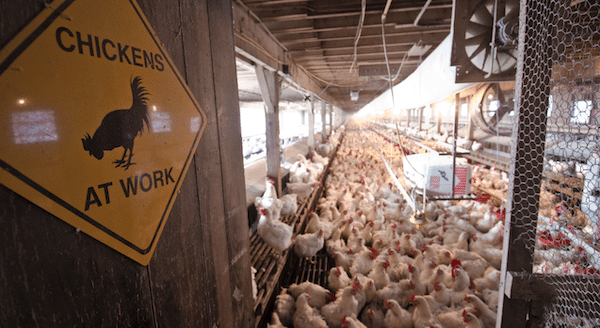This column was produced for Progressive Perspectives, a project of The Progressive magazine, and distributed by Tribune News Service.
Three people, nearly 100 million chickens, and 126 herds of dairy cattle across twelve states have, so far, been infected by the latest wave of avian flu sweeping the nation. Like it or not, bird flu is back, bringing with it threats of the next global pandemic, supply chain turmoil, and food price shocks that can decide elections.
Bird flu has become a semi-annual occurrence in America, regularly laying bare the cracks in our brittle food system. As food production becomes increasingly industrialized, consolidated, and precarious, we have transformed H5N1 from an isolated zoonotic disease into a nation-shaking phenomenon. Only in our misguided system could a sick bird in one state ravage a dairy farm in another and stoke legitimate concern of the next global pandemic.
Industrial factory farms are at the center of our corporate food system. They cram hundreds of thousands of animals with near-identical genetics into desperately tight quarters, creating perfect breeding grounds for infectious disease.
This could have been avoided. Federal and state policies have traded the resiliency of diversified small-scale farms for the profit efficiency of Petri dish confinements. Today, 75 percent of egg-laying hens in the United States are raised on just 347 factory farms, with an average of nearly 850,000 animals per operation. The typical American dairy farm now confines more than 2,000 animals, while the number of smaller-scale dairy farms has plummeted to barely a third as many today as twenty years ago.
Processing facilities have been similarly consolidated into the hands of a few big players. Huge corporations today own nearly all elements of the food chain, moving animals, eggs, and dairy (plus the diseases they often carry) through a tight network of processing facilities, increasing the likelihood of rapid contamination across the country.
In many ways, we’ve put all our eggs in one basket. When that basket is overturned, the effects are disastrous.
Meanwhile, corporate food chain giants are notorious for exploiting crises like these to profit off of consumers. A recent Federal Trade Commission (FTC) report finds that the grocery cartels did just this during the COVID-19 pandemic, leveraging vast market power to capitalize on high prices—generating revenues far surpassing total costs and contradicting companies’ assertions that higher grocery shelf prices were necessary to cover their own costs.
In late 2023, a federal jury ruled that Cal-Maine, the nation’s largest egg producer, and other major egg producers conspired in the mid-2000s to fix egg prices and gouge shoppers. These corporations call the shots in Washington and gaslight us to cover their profit losses when the system they built fails.
Corporations used the specter of bird flu outbreaks to raise egg prices to a record high of nearly $5 per dozen in January of last year. Cal-Maine leveraged high egg prices into a sixfold profit increase despite not experiencing a single bird flu outbreak in its flocks until eleven months later. Today’s outbreak may bring more of the same. Public wariness of a worsening bird flu outbreak will likely be all the fodder companies need to profiteer once again.
Getting serious about protecting Americans from bird flu and price-gouging means taking aim at food monopolies and factory farms. President Joe Biden has begun to target food sector monopolies for the role they play in artificially driving up prices. But there is much more work to be done.
Biden’s Federal Trade Commission must investigate scheming operators like Cal-Maine for price collusion and anti-competitive practices. And Congress should pass the Farm System Reform Act and the Price Gouging Prevention Act, smart legislation that transitions out of factory farming and makes price-gouging illegal.
The longer we wait to overhaul our food system, the more corporations will exploit it at the expense of American consumers, family farmers, and our health.
Wenonah Hauter is the founder and executive director of the national environmental advocacy organization Food & Water Watch, and the author of Foodopoly: The Battle Over the Future of Food and Farming in America.

